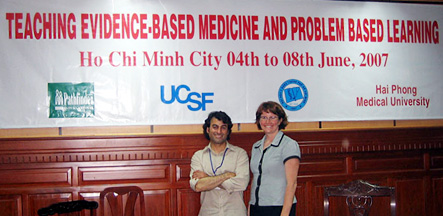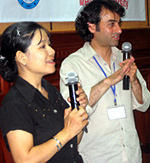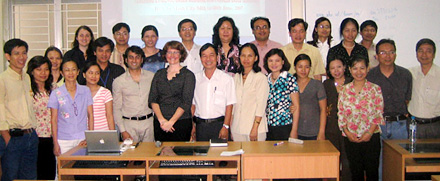By S. L. Bachman
A group of Vietnamese doctors, professors and medical school administrators listened attentively as two American obstetrician-gynecologists explained how evidence-based medicine is being used in the United States as a teaching tool.
UCSF Assistant Clinical Professor Jody Steinauer, MD, and Associate Professor George Sawaya, MD, asked them to discuss a medical journal article showing the relative safety of intrauterine devices (IUDs) compared with other contraceptives when used by nulliparous women - women who have not already given birth.
The article, said Steinauer and Sawaya, was an example of how a cohort study - a study, over a defined period of time, of a group of people who share a common characteristic - could be used to determine whether a medical intervention was safe for a specific population.
Feelings were mixed among the three dozen Vietnamese clinicians, medical school professors and deans gathered at the University of Medicine and Pharmacy in Ho Chi Minh City. Many of the deans were about to introduce evidence-based medicine to their classrooms, and others planned to introduce teaching using evidence-based medicine in coming years.
The evidence was interesting, they said, because it is commonly assumed that nulliparous women are not good candidates for an IUD.
They pointed out, however, that asking an unmarried woman whether she was having sex would challenge traditional expectations of a woman's behavior before marriage.
"I was impressed with their genuine interest in revamping their curriculum," Sawaya said later.
At the same time, Steinauer said, "The idea of asking unmarried women a potentially awkward question led to a lot of discussion."
UCSF's Bixby Center Conducts Vietnam Medical Education Reform Project
Sawaya and Steinauer were in Vietnam in June as part of a multi-year project conducted by Pathfinder International, one of the oldest US-based nongovernmental organizations focused on family planning, in collaboration with UCSF's Bixby Center for Reproductive Health Research & Policy to introduce evidence-based medicine and problem-based learning methods into Vietnamese medical education.
The Vietnam curriculum reform project is the outgrowth of work by Uta Landy, PhD, and Philip Darney, MD, MSc, both of the Bixby Center, in UCSF's Department of Obstetrics, Gynecology and Reproductive Sciences.
Landy was initially approached by Pathfinder International with an idea for strengthening Vietnamese medical education.
 |
George Sawaya and Jody Steinauer.
|
In 2003, the Bixby Center formed a partnership with Pathfinder International and all eight Vietnamese medical schools to promote medical education reform, beginning with reproductive health.
Two schools - in Ho Chi Minh City and Haiphong - have pledged to introduce the new teaching methods into their curricula this year.
Between 2004 and 2006, three courses were held in San Francisco for delegations of chairs and deans of obstetrics and gynecology departments of Vietnam's medical schools, as well as representatives from the Vietnamese Ministry of Health and Ministry of Education and Training.
Pathfinder International then asked Landy, the project's principal investigator, and her team to organize three short courses over the next three years in Vietnam, featuring expert faculty from UCSF. The short courses would focus on introducing evidence-based medicine and problem-based learning to their teaching. Pathfinder International also asked for involvement of UCSF faculty in seminars on health policy.
Project Assists Vietnamese Educators in Effectively Reforming Medical School Curricula
Darney, who is a Bixby Center founder and director, said that the curriculum reform project aims to help the Vietnamese medical schools learn new ways to restructure their curricula, while catching up with the latest thinking in clinical practice. It also will introduce them to new research in reproductive medicine and train them in skills they can use to stay on top of medical advances.
 |
"All of medicine changes very quickly," said Darney, who is chief of Obstetrics and Gynecology at San Francisco General Hospital. "We are trying to turn them into lifelong learners."
Darney and Landy hope that the Vietnam program will be the first of many international programs.
"We have developed a unique model for teaching about curriculum reform, using experiences both here and in Vietnam, based on our extensive experience in curriculum reform at UCSF," said Landy.
"We hope to partner with other medical schools and policymakers in developing countries," added Landy, who directs two initiatives - the Fellowship in Family Planning and the Kenneth J. Ryan Residency Training Program in Abortion and Family Planning - in the United States to enhance medical education and clinical practice in pregnancy termination and contraception.
In late October, Sawaya and Assistant Clinical Professor Rebecca Jackson, MD, accompanied by curriculum reform project manager Beckie Anderson, traveled to Haiphong to conduct the second short course in evidence-based medicine and problem-based learning.
Also in November, UCSF faculty will participate in a policy development seminar for Vietnamese government and medical school policymakers.
Leading the discussion will be Darney and Landy, along with Lee Learman, MD, PhD, and UCSF Executive Vice Chancellor and Provost A. Eugene Washington, MD.
UCSF Experts Lead the Bixby Center Courses
The Bixby Center courses are being taught by some of UCSF's most widely recognized experts in medical education:
-
• Steinauer, Sawaya, Jackson and Learman are members of the Haile T. Debas Academy of Medical Educators, a cross-departmental association of many of UCSF's most highly regarded teachers. The four faculty members teach regularly in UCSF epidemiology courses, and both Sawaya and Jackson are medical student course directors.
- • Sawaya is an internationally recognized expert in evidence-based medicine, which he teaches at UCSF and other institutions. He is a member of the high-profile US Preventive Services Task Force, a government-sponsored, independent panel that for two decades has set the standard for evidence-based clinical guidelines.
- • Learman, a former director of the residency program in the Department of Obstetrics, Gynecology and Reproductive Sciences, is an expert on continuing education and professional ethics. Also known for his expertise in competency-based assessment, he is currently director of curricular affairs for the Office of Graduate Medical Education in the UCSF School of Medicine.
- • Washington, former chair of the Department of Obstetrics, Gynecology and Reproductive Sciences, is internationally known for his work on assessing medical technologies, developing clinical practice guidelines and developing disease prevention policies, particularly for women's health.
"UCSF has been a national leader in medical education reform," Washington said. "And it is truly impressive to see all eight medical schools in Vietnam and the ministries of health and education collaborate. Given this national partnership and our collective experiences, a unique opportunity exists for us to help facilitate the medical education transformation currently underway there."
UCSF Collaborates with Vietnam in Several Other Educational Initiatives
The Bixby Center project is one of several UCSF initiatives in Vietnam, including a historic agreement reached in March between the University and Vietnamese officials to collaborate in health sciences research and teaching.
 |
Medical education reform in Vietnam is hampered by a shortage of computers for research by medical school faculty and students. Language also is a barrier: Most medical journals are published and reviewed in English, a language in which many Vietnamese faculty and students are not proficient.
The computer shortage should shrink as the cost of computers falls. Language should become less of a barrier as Vietnam's Central Institute for Medical Science Information compiles a database of biomedical journal articles, with abstracts in Vietnamese and English. And online access to international medical journals should improve, thanks to a World Health Organization effort to help developing countries.
Medical education traditions might take longer to change.
Classes at Vietnamese medical schools traditionally emphasize lecturing and memorization, Steinauer said. Professors are highly respected and rarely questioned.
In medical education using evidence-based medicine and problem-based learning, professors act less as final authorities than as guides, while students sort through the symptoms of a theoretical patient and related research evidence to arrive at a diagnosis and treatment plan.
Some of the Vietnamese professors, accustomed to having the last word in the classroom, doubted that a class full of students vigorously discussing a case could come up with appropriate answers.
"Many times, they asked us, 'How do you keep chaos from breaking out in the classroom?'" said Steinauer, who observed classes and teaching methods in Vietnam for a month preceding the first short course, held in June.
Other professors, she said, welcomed the idea of always looking for the latest evidence about ways to address a medical problem, and also welcomed the problem-based approach to studying medicine.
Steinauer recalled one Vietnamese professor saying, "I am so used to being the expert and the lecturer. But in a way, this is easier. There is less pressure on me. I can just guide the students while they come up with their own answers. Sometimes, I learn from that too."
Photos/Beckie Anderson
Related Links:
Bixby Center for Reproductive Health Research & Policy at UCSF
advancing health worldwide™ website
Vietnamese Strengthen Collaboration with UCSF
UCSF Today, April 20, 2007
GHS-Vietnam Collaborations
UCSF Global Health Sciences News, January 10, 2007
 Giving Sight to the Blind: Children's Hospital Pediatric Ophthalmologist Treats Patients in Vietnam
UCSF Today
Giving Sight to the Blind: Children's Hospital Pediatric Ophthalmologist Treats Patients in Vietnam
UCSF Today, October 27, 2006
Vietnamese and US Partners Sign Pharmacy Agreement
UCSF School of Pharmacy, November 18, 2005
Team Makes Medical Mission to Vietnam
UCSF Newsbreak, January 22, 1999
 Giving Sight to the Blind: Children's Hospital Pediatric Ophthalmologist Treats Patients in Vietnam
UCSF Today, October 27, 2006
Vietnamese and US Partners Sign Pharmacy Agreement
UCSF School of Pharmacy, November 18, 2005
Team Makes Medical Mission to Vietnam
UCSF Newsbreak, January 22, 1999
Giving Sight to the Blind: Children's Hospital Pediatric Ophthalmologist Treats Patients in Vietnam
UCSF Today, October 27, 2006
Vietnamese and US Partners Sign Pharmacy Agreement
UCSF School of Pharmacy, November 18, 2005
Team Makes Medical Mission to Vietnam
UCSF Newsbreak, January 22, 1999



 Giving Sight to the Blind: Children's Hospital Pediatric Ophthalmologist Treats Patients in Vietnam
UCSF Today, October 27, 2006
Vietnamese and US Partners Sign Pharmacy Agreement
UCSF School of Pharmacy, November 18, 2005
Team Makes Medical Mission to Vietnam
UCSF Newsbreak, January 22, 1999
Giving Sight to the Blind: Children's Hospital Pediatric Ophthalmologist Treats Patients in Vietnam
UCSF Today, October 27, 2006
Vietnamese and US Partners Sign Pharmacy Agreement
UCSF School of Pharmacy, November 18, 2005
Team Makes Medical Mission to Vietnam
UCSF Newsbreak, January 22, 1999